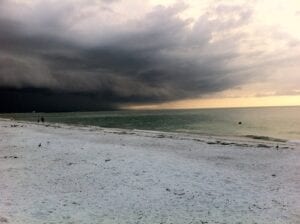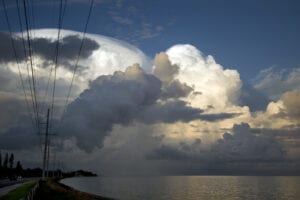June 11, 2021 | By Kaitlin Murphy-Knudsen

Last week, Florida’s dry season gave way to the summer clouds that grow big and gorgeous across the sky, peaking into Joni Mitchell’s ice-cream castles, ominous thunderheads, and shelf clouds that divide the sky in jarring contrasts of dark and light. When the rain comes now, it is not the cool summer rain I grew up with in New England. There, rain breaks the heat like a kindness, wringing it out of the air for a few hours or days.
Not here. For the next six months, goodbye to Florida’s static blue sky that draws snowbirds and spring breakers. Now, the whole sky is change, the only constant a wet heat that will not yield until sometime around Thanksgiving. My father calls it cabin fever season, the reverse of New York winters that turn people into pained-lunged speed walkers racing through bitter cold from one warm space to another. Now Dad’s dash is from one air-conditioned or shaded haven to another.

I have lived in Florida for almost ten years now, but only in the last few have I forged a tentative peace with the heat, stopped whining long enough to appreciate the majesties of a Florida summer.
Backward as it may seem, summertime here (yes, Florida has seasons!) reminds me of a winter I spent in Buffalo, New York, where I drove most mornings to work through blinding pre-dawn snowfalls, passing children standing at bus stops to go to schools that would not be canceled for mere whiteout conditions. You see how they’re the same, right?
On one such morning in Buffalo, on an empty stretch of road, I lost control of my car, spinning 360 a few times before landing in someone’s yard, headlights facing the road. I sat for a minute, feeling how quiet it was, how nobody had noticed my silent, slow-motion (in my head) near brush with death.
I took a deep breath, put my blinker on (yes), pulled back into the road, and continued to work, where my colleagues were not impressed.
“It happens,” they said. Still, when spring approached, even the most hardy of Buffalo souls were counting down the days to spring’s relief.
Same here in Florida, on the flip side in the heat and dangers of hurricanes.

Why reflect on sense of place?
Too long to answer in a blog! But what is your answer? To me, the places that become a part of us, the rhythms and change of seasons and skies, can be an opening into writing and living in duality: what we risk and endure, and the beauty that exists within that.
Funny that the day after writing this, I happened to hear from author and teacher Pema Chödrön on the topic of sitting in duality, “There is no cure for hot and cold.”1
By November I will be crying for mercy for the weather to flip back to the other side. The change seems to happen in a single week you can point to, when the heat breaks back into winter’s cool mornings, offering shiny and weightless breaths of air for the taking. Still, I don’t want to live waiting for the heat to pass. And I’ll throw out a fairly educated guess that one-sided, Panglossian living just might lead to crappy writing too, at least for me.

In Buffalo, the lake effect snow came silent and thick, though Buffalo readers will also know the sounds of winter thunderstorms, the loud and sudden cracks of branches breaking under the weight of ice and snow. Just outside your window, they can make you jump awake in bed sure that the roof had just cracked in two (Or is that just me?)
In Florida, the summer sky makes the best kind of noise. The other night the rain fell in sheets across the roof, thunder rolling in just behind it, waking us up like a salutation: the season has begun.
Like characters in a book, both places are alive in me. The sound and silence, the bitter cold and wet heat, the piling drifts and Joni Mitchell’s piling ice-cream castle clouds.
So you agree, yes? They are the same. Best to let them settle, foreboding and beauty both.
Writing Exercise
Ok, now you. What is your sense of place? What surrounds you so presently it has become a part of you? How might you put it into words? Try it, from both sides now.
. . .
You can explore Kaitlin Murphy-Knudsen’s work at kaitlinmurphy.org
_______________________________________________________
- Pema Chödrön, The Places that Scare You, citing Tibetan Buddhist meditation master Chögyam Trungpa.




